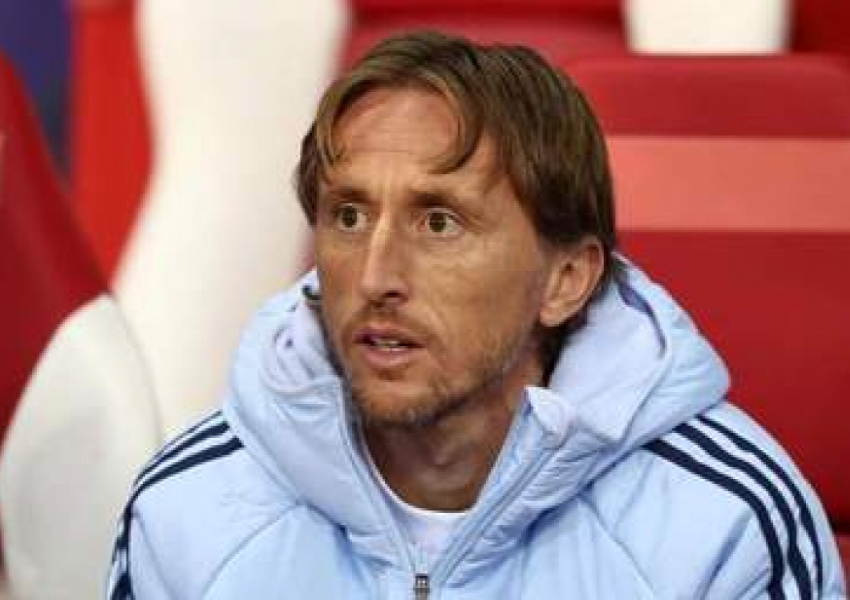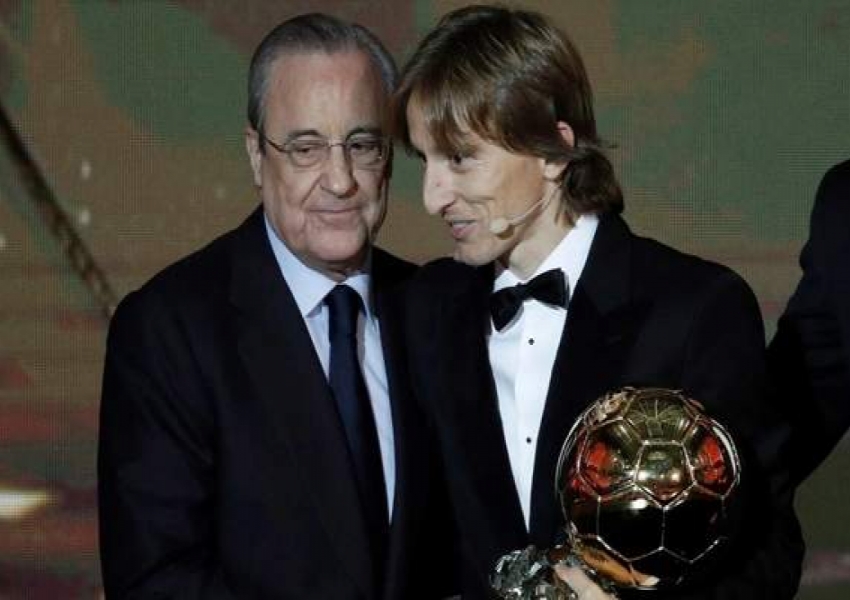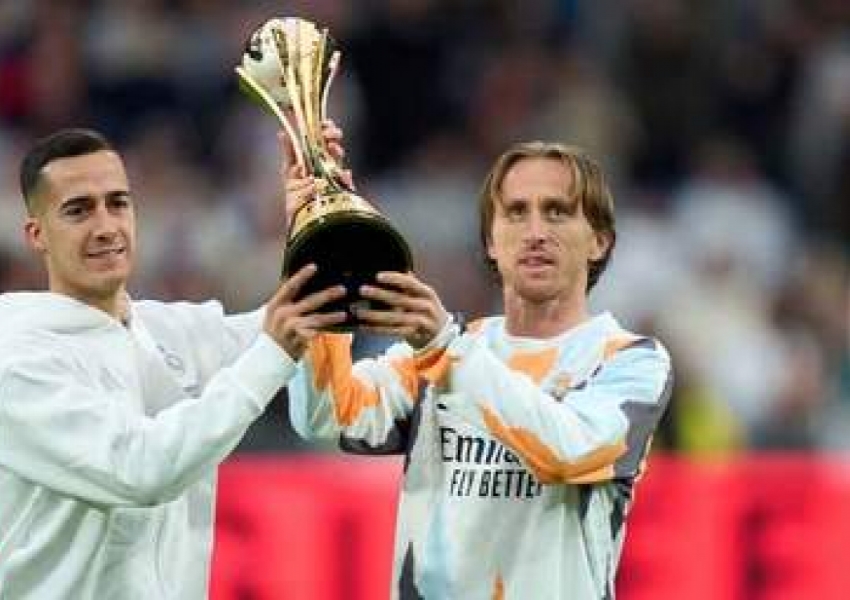Modrić’s Three Concessions Rejected by Real Madrid: Only a 14-Day Contract Offered — Leaving After Club World Cup
At 39 years old, Luka Modrić is on the verge of bidding farewell to Real Madrid this summer after a legendary 13-year career. Over that span, Modrić amassed an astonishing 28 trophies, creating a legacy few in football can rival. Fans and pundits alike once assumed that Modrić would extend his stay for at least one more year — perhaps retiring in 2026 with a final farewell at the Santiago Bernabéu. But reality has proven far more complex and, ultimately, less sentimental.

On May 23, AS revealed the inside story of Modrić’s attempts to stay at Real Madrid and the club’s firm refusal to grant him a standard one-year contract extension. Despite the Croatian maestro’s willingness to make significant personal and professional sacrifices, Real Madrid’s management has decided to part ways in a stark and pragmatic manner: offering Modrić only a short 14-day contract to complete the upcoming Club World Cup before leaving.

The Weight of a Legend: Modrić’s Final Season
The 2024-25 season was a tough campaign for Real Madrid, riddled with injuries and uncertainties. Amid the chaos, Modrić carried the team on his seasoned shoulders. He made 55 appearances across all competitions, contributing 4 goals and 9 assists — remarkable output for a veteran player in the twilight of his career. As captain and one of the team’s most influential figures, Modrić was a stabilizing force, even as younger talents emerged.

Modrić expressed a desire to continue playing for another year, hoping to extend his career to 2026 before formally retiring at Real Madrid. The incoming head coach, Xavi Alonso — himself a former teammate and close confidant — reportedly supports this plan and has urged the club’s management to keep Modrić around, emphasizing his value on and off the pitch.
Three Major Concessions: Modrić’s Plea to Stay
According to AS, Modrić put everything on the table in his bid to extend his contract. His three key concessions included:
-
Significant Salary Reduction: Last summer, Modrić took a drastic pay cut, dropping from a pre-tax €22 million annual salary to just €10.4 million. He expressed willingness to reduce his wages even further if it meant staying with Real Madrid for one more year.
-
Accepting a Backup Role: Despite his status as captain, No. 10, and a Ballon d’Or winner, Modrić showed humility by agreeing to accept a substitute role if necessary. He pledged to never create locker room drama or disrupt team harmony, demonstrating his dedication to the club’s greater good.
-
Patience with Decision-Making: Modrić made clear he was willing to wait for the club’s decision and not rush the process, reflecting his respect and understanding for the club’s needs.
The Club’s Stubborn Stance: A Clear “No”
Despite these concessions, Real Madrid’s board remained unmoved. The club’s official stance is that extending Modrić’s contract for a full year would hinder the development of younger talents like Jude Bellingham and Aurélien Tchouaméni (referred to as “Guiller” in Spanish coverage), who are seen as the future core of the squad.
Ultimately, the decision-making power rests with club president Florentino Pérez, who has maintained a pragmatic approach in this matter. The club is focused on moving forward and promoting youth, even if it means severing ties with a club legend.
A 14-Day Contract: A Short-Term Farewell
The unique circumstances surrounding the newly reformatted FIFA Club World Cup — scheduled to conclude on July 13, 2025 — have shaped Real Madrid’s offer to Modrić. Rather than a conventional contract extension, the club is offering him a brief 14-day deal, allowing Modrić to participate in the Club World Cup and then exit the club.
This approach echoes the treatment of Lucas Vázquez, another long-serving player whose contract was similarly limited to 14 days. It reflects a stark, business-like mentality toward players perceived to have limited future value to the squad.
Barrios’ Fate: No Even Short-Term Contract
Unlike Modrić and Vázquez, Jesús Vallejo will not receive even a short-term contract extension. His deal expires on June 30, and Real Madrid has no plans to include him in the Club World Cup squad. His departure will coincide with the end of the La Liga season on May 25, marking the conclusion of his chapter at the club.
A Complex Farewell: Emotion vs. Pragmatism
The manner of Modrić’s exit highlights the tension between emotion and pragmatism in modern football. On one hand, Modrić is a player who defined an era for Real Madrid — a team leader, a global superstar, a true symbol of the club’s success over more than a decade.
On the other hand, Real Madrid is a club perpetually focused on the future. With a deep squad full of promising talent, the management prioritizes the emergence of the next generation above all else. The decision to limit Modrić’s contract to the Club World Cup window symbolizes a cold calculus — one that many fans and observers will find difficult to accept.
Luka Modrić: A Career Etched in Glory
Modrić’s Real Madrid tenure is nothing short of legendary. Beyond the 28 trophies, his influence extended far beyond statistics. He bridged generations of players, adapting to tactical evolutions and mentoring emerging stars. Modrić was a linchpin of success under multiple coaches, epitomizing professionalism and resilience.
His willingness to reduce his salary, accept a lesser role, and patiently await the club’s decision is a testament to his character. It reveals a player whose loyalty and love for Real Madrid remained steadfast — even when the club’s loyalty to him wavered.
Looking Ahead: What This Means for Real Madrid
Real Madrid’s decision to part ways with Modrić marks a clear signal of a new era — one led by youth, speed, and modernization. Bellingham and Guiller will take on more responsibility in the midfield, as the club focuses on building a squad for sustained future success.
However, the short-term, transactional nature of Modrić’s contract offer may leave a bitter taste for many supporters who view him as an irreplaceable icon. The 14-day deal, while pragmatic, is a stark departure from the sentimentality usually afforded to club legends.
Language Spotlight: The Power of Resignation and Respect
Modrić’s concessions — salary cuts, backup acceptance, and patient waiting — speak volumes about his professionalism. The narrative frames him not as a diva star demanding privileges but as a humble servant willing to sacrifice for the club’s benefit.
The stark refusal from Real Madrid, juxtaposed with Alonso’s support for Modrić, highlights the divide between the club’s strategic priorities and the emotional attachments within its ranks. The 14-day contract phrase acts as a powerful symbol of cold pragmatism, sharply contrasting the warmth traditionally associated with a farewell to a legend.
This story encapsulates the modern football dilemma: balancing financial and sporting strategy with respect for history and loyalty. It challenges fans and executives alike to consider what truly matters — legacy or progress, sentiment or success.
In the end, Luka Modrić’s departure is bittersweet. It marks the end of a golden chapter in Real Madrid’s history, told through sacrifices, loyalty, and unparalleled achievement. Yet, it also signals a stark new reality, where even legends must sometimes bow to the relentless march of time and the business of football.
Copyright Statement:
Author: mrfootballer
Source: Mrfootballer
The copyright of this article belongs to the author. Reproduction is not allowed without permission.
Recommended Blog
- 97th-Minute Thunderbolt Seals Levante's Return to La Liga: A Night of Redemption and Euphoria
- UEFA Champions League 2025/26: Full List of 29 Direct Entrants Confirmed — Premier League Secures Unprecedented Six Spots
- Xabi Alonso Returns to Real Madrid for Third Time: Only Two Old Teammates Remain, Farewell to Modrić After Club World Cup
- Serie A Title Celebration Turns Chaotic: 39 Injured, 10 Robberies, and Historic Monument Damaged in Napoli
- Ten Years, 34 Appearances, 12 Trophies: Real Madrid’s “Silent Champion” Vallejo Set to Leave Without World Cup Registration
- First Summer Exit? Barça’s No.10 Agrees to Leave: Set to Compete in Ligue 1, A Move with Four Benefits
- Witnessed by 70,000 Fans: The Most Expensive Final in History Kicks Off Tonight — Winner Promoted to Premier League Worth £220 Million
- Championship Play-Off Final Preview: Sheffield United’s Resurgence vs Sunderland’s Lingering Struggles
- Tonight’s Real Madrid Finale: 70,000 Witness Magic as Modrić and Three Stars Say Goodbye, Mbappé Chases 30 Goals
- Standing Ovation: 65-Year-Old Ancelotti Waves Goodbye, Thanks Real Madrid — “If I Cry, That’s Normal”